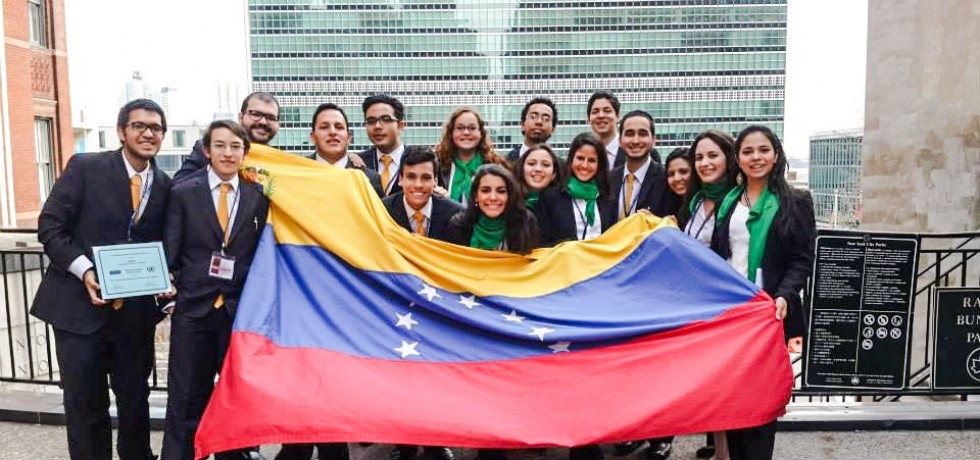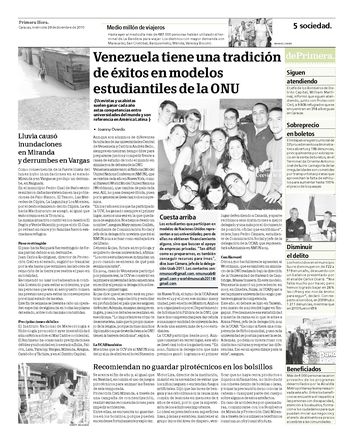Venezuela tiene una tradición de éxitos en modelos estudiantiles de la ONU
-[ Ucevistas y ucabistas suelen ganar cada año estas competencias entre universidades del mundo y son referencia en América Latina ]. Joanny Oviedo.
PRIMERA HORA – Miércoles 29 de Diciembre de 2010. Pág. 5.
Aunque son alumnos de diferentes facultades de las universidades Central de Venezuela y Católica Andrés Bello, siempre encuentran tiempo libre para prepararse juntos y competir frente a casas de estudio de todo el mundo en simulacros de debates de la ONU.
Venezuela asiste tanto al National Model United Nations Conference (NMUN), que se celebra cada año en Nueva York, como al Harvard World Model United Nations (Worldmun), que cambia de país cada vez. Allí, no pasa desapercibida, pues por lo general se lleva casi todos los premios.
“En los 7 años en los que ha participado la UCV, ha ganado siempre el primer lugar, menos una vez en la que quedamos de segundos. Nos hemos creado un nombre”, asegura Marycarmen Guillén, estudiante de Comunicación Social y jefa de la delegación ucevista que irá al NMUN 2011 a actuar como embajadora de Líbano.
Génesis Rojas, futura antropóloga y arquitecto de esa universidad, afirma: “Los otros estudiantes se intimidan un poco cuando se enteran de qué país venimos (sonríe)”.
En 2004, cuando Venezuela participó por primera vez, la UCV se convirtió en la primera universidad latinoamericana en recibir el premio a delegación sobresaliente o primer lugar.
Rojas dice que el secreto está en practicar oratoria, negociación y estudiar en profundidad el país que les asignen defender. Además, ensayan siempre en inglés, pues los debates se realizan en ese idioma. “Lo importante es cómo te desenvuelvas, más que tu propio manejo de la lengua, porque incluso muchos diplomáticos que de verdad van a la ONU tienen la barrera del idioma”, explica.
La UCAB también Mientras que la UCV irá al NMUN 2011 del 17 al 21 de abril en el hotel Sheraton de Nueva York, el turno de la UCAB será entre el 19 y el 23 en ese mismo mes y ciudad, pero en el hotel Marriott. Ambos son organizados por el Departamento de Información Pública de la ONU, que hace dos competencias para dar cabida a una mayor cantidad de universidades.
A cada una asisten más de 5.000 estudiantes.
La UCAB participa desde 2007. Aunque comenzó en tercer lugar, este año se llevó casi todos los galardones. “En 2010, fuimos la delegación que más premios ganó: logramos el primer lugar defendiendo a Canadá, y aparte recibimos seis distinciones a mejor delegado y una más por el documento de posición oficial que escribimos”, relata Juan Pedro Cámara, estudiante de Comunicación Social y jefe de la delegación de la UCAB, que representará a Alemania en NMUN 2011.
Con Harvard Otros 2.500 bachilleres le apuestan al Worldmun, que es también un simulacro de la ONU realizado bajo la dirección de la Universidad de Harvard de Cambridge, Massachussets. En este modelo, Venezuela marcó un precedente: en 2007, en Ginebra, Suiza, la UCAB pasó a ser la primera universidad no anglo parlante en ganar la competencia.
Este año, el debate se hizo en Taiwán, y en marzo de 2011 tendrá lugar en Singapur. Precisamente esa variabilidad y mezcla de razas es lo que le atrae a Alana Pérez, jefa de la delegación 2011 de la UCAB. “Es como si fuera una competencia de fútbol mundial, pues cada universidad se postula para ser la sede.
Además, podemos interactuar con distintas culturas y respetar las diferencias. Eso es un aprendizaje para la vida”, asegura.
Fuente:http://impresodigital.el-nacional.com/primera_hora/ediciones/2010/12/29/



